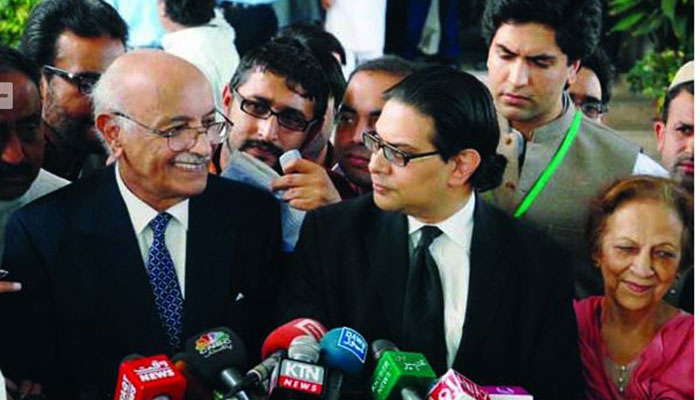Asghar Khan — A military democrat
'He might have been a bit eccentric but politicians like Asghar Khan are a rarity'
January 06, 2018

September weather in Abbottabad, especially at night, gets a bit cold so I wore a jacket. But as I walked down the long driveway of Air Marshal Asghar Khan’s house, I felt sweat on my forehead. It may have been because of anxiety, as you never know how the Air Marshal would react to the questions I had in mind.
For months I had been after Asghar Khan to give an interview for my book. I first contacted him in February of 1990, when I started working on the book — related to the country's fragile democracy and whether it can be sustainable under the shadow of the strong military establishment.
The Air Marshal didn’t agree with this premise. He believed democracy will now become stronger with time and there is no need to start this debate. For the next couple of months, as I interviewed other major leaders, I contacted him again but the answer was the same.
After the Benazir Bhutto government was dismissed in August of 1990, he probably realised that things aren't exactly how he believed them to be. And in this context, he contacted me in September of 1990 and agreed to the interview.
As I walked down the long and steep driveway to his palatial home’s annexe, I was thinking how direct and blunt my questions should be. Asghar Khan had a reputation of walking out of interviews if he got irritated.
The first thing he said after entering the room: "I still don’t agree with your premise completely, but lets talk."
The word ‘completely’ gave me strength, as it meant he partially agreed with the view that democracy will face huge challenges in the years to come.
Though he remained elusive on the direct role of the then-military establishment in removing Benazir Bhutto, he was of the view that there should not be any direct or indirect role of the military in the political process. “Army should not get involved in politics in any way,” the Air Marshal said.
He was very critical of the "biased" accountability process against Benazir. It may have been because of his recent contact with BB to form an electoral alliance. He praised Benazir saying she is an intelligent and progressive person with great leadership skills.
As compared to his stance a few months back that democracy is now here to stay, he agreed with me that day, that the vested interests developed during the 11-year-rule of General Zia will remain a big challenge for democracy. The space taken by the military in almost all spheres of life was something it was not ready to share. Both Benazir Bhutto and Nawaz Sharif, rather than strengthening democracy, played in its hands and were unable to gain any space for the civilians.
The 1990s showed us exactly what we discussed in Abbottabad that day.
Asghar Khan has always been regarded as an honest person. But his political career had seen many ups and downs. He became a principled politician mainly in the last phase of his political life. Otherwise, his role during the PNA movement was quite controversial and also contributed to the army's entry during the 1977 agitation.
Though he realised it in 1990, it took the Air Marshal some years to come forward and challenge the conspiracies, later known as the Asghar Khan Case. It took more than a decade for the courts to rule on the case. Yet nothing has been done to check the imbalance in Pakistan’s political power structure so far.
Of the 14 top politicians interviewed for the book, none disagree with the premise that a strong democratic system is needed. They were of the view that the only way forward for all the political forces is to get rid of the constitutional amendments made during the Zia era and not let a third force divide and rule. Practically they all become stooges. It took them decades to realise their mistakes — some of the things Asghar Khan pointed out in September of 1990.
He might have been a bit eccentric but politicians like Asghar Khan are a rarity. In today’s political scenario, a lot more may be needed for politicians to get the encroached space back. But for that, one has to be arrogantly honest and ready to sacrifice the luxuries most of them enjoy today.
The writer is the managing director of Geo News.











